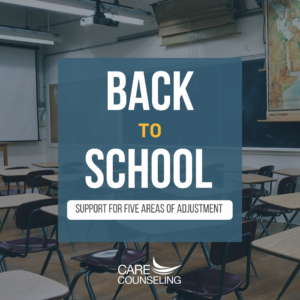Addressing Mental Health for Back to school
 Can you believe that back to school is around the corner? Students of all ages will be returning to school in less than a month. This includes children under five, school-aged children, adolescents, and college students. Common stressors that will require a period of adjustment are listed below. How each person adjusts, will vary.
Can you believe that back to school is around the corner? Students of all ages will be returning to school in less than a month. This includes children under five, school-aged children, adolescents, and college students. Common stressors that will require a period of adjustment are listed below. How each person adjusts, will vary.
Changes in Schedules and Routines
For most students, alarms will go off earlier in the morning and bedtimes will be earlier. Now is the time to begin adjusting to these anticipated changes by gradually acclimating one’s body to sleep/ wake times in half-hour increments rather than a drastic change during the first week of school. Getting grounded in new routines as early as possible will help prepare students for success. Children who will be experiencing changes in living situations for the school year such as split-parent households will need extra time to adjust.
New Schools and Classrooms
Getting used to changes in schools and classrooms can be very stressful. As a therapist who has previously provided school-based mental health services, there is a predictable spike in behavioral referrals around October. Finding a mental health therapist with available openings can be challenging when waiting until a child is in a state of crisis. Having therapeutic services early can help empower students to navigate transitions prior to school starting while providing support and encouragement during the early months helps all go smoothly.
Increased Responsibility
Parents/ caregivers often face increased responsibilities during the school year such as managing households with multiple schedules and children. For this reason, adults can also benefit from a supportive outlet to process stressors and have good strategies to cope. Academic challenges and managing time around homework, social activities, and extracurriculars are common stressors for both children and their families.
Social Challenges
Some children struggle to make and keep friends. They may struggle with social skill development or social anxiety disorder. Bullying is a problem for many children, but LGBTQ youth and youth with disabilities are especially at-risk for being bullied. Negative peer influences are another concern such as peer pressures to engage in risky or dangerous behaviors.
Emotional and Behavioral Concerns
If you or your child are struggling with adjustment, pay attention to the following emotional and behavioral signs.
- Withdrawal from previously enjoyed activities or depressed mood
- Significant changes in sleep, appetite, or activity levels
- Angry mood or irritable behavior
- Becoming increasingly anxious or fearful
- Difficulties concentrating and focusing
- Hyperactivity and impulsivity
- Aggression or self-harm
- Suicidal thoughts*
- Using substances to cope
Please talk to your doctor or therapist about these concerns. Mental health screening can help detect emotional and behavioral concerns early and assist with recommendations to help. Short-term therapy can be a great option for those who need some additional support during times of adjustment, and long-term therapeutic support is also available.
*988 Suicide and Crisis Lifeline https://988lifeline.org/ is available 24/7 to provide free, confidential support for those in distress. https://www.thetrevorproject.org/ also provides 24/7 support for LGBTQ young people.
Written By: Charlotte Johnson, MA, LPCC



























